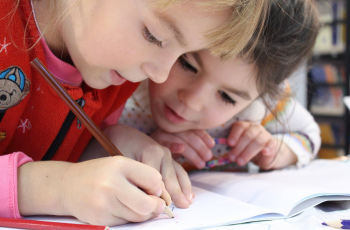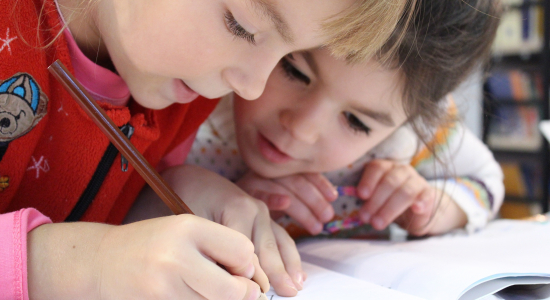
newintown
18-02-2014 om 14:15
Nederlands ouderschap/opvoeding
Excuses voor mijn Nederlands ik ben Canadese.
Als je Nederlandse opvoeding te beschrijven in een zin, wat zou het zijn?
Zijn er uitdrukkingen (in het nederlands) over ouderschap/opvoeding?
In Engels wij hebben "children should be seen, not heard" of "boys will be boys" of "never wake a sleeping baby" ("kinderen moeten worden gezien, niet gehoord" or "boys will be boys" or "nooit een slapende baby wakker"
Is er een Nederlands ouderschap manier?
Dank je wel! Dit wordt interessant!

Jippox
18-02-2014 om 14:34
nou
Ik zou het niet in 1 zin samen kunnen vatten, en heb ook weinig met de Engelse uitdrukkingen die je noemt. Als ik er dan toch eentje moet geven die het ouderschap zo'n beetje samenvat, dan is het:
"waar gehakt wordt, vallen spaanders"
![]()

mirreke
18-02-2014 om 15:05
Ik heb geen one-liner
Wel een artikel vanuit Amerikaanse optiek.
De titel slaat in eerste instantie misschien niet op jouw vraag, maar de centrale boodschap wel:
Samen gezellig, samen onderhandelen, geef vertrouwen, dan krijg je het terug.
Dit artikel maakt een soort vergelijking op basis van het aantal tienerzwangerschappen in de VS (waar tienersex zwaar verboden is) en in Nld (veel minder, maar waar tienersex of liever tienerrelaties veel serieuzer worden beschouwd).
Erg interessant: uiteindelijk gaat het over opvoedstijl: Neem je kind serieus, nog zoeen.
(Updated) Teen birth rates are eight times higher in the U.S. than in Holland. Abortion rates are twice as high. The American AIDS rate is three times greater than that of the Dutch. What are they doing right that we’re not?
For starters, two-thirds of Dutch parents report allowing their teenage children to have sleepovers with their boyfriend or girlfriend, a situation even the most liberal American parents would rarely permit. Is there something Americans should learn from the Dutch about relaxed attitudes toward sex (and drugs — indeed, the Netherlands has more lenient drug laws than the U.S., but three times lower rates of marijuana use)?
Healthland spoke with Amy Schalet, author of Not Under My Roof: Parents, Teens and the Culture of Sex, an assistant professor of sociology at the University of Massachusetts, Amherst.
What got you interested in the studying the differences between American and Dutch approaches to teen sexuality?
I was born in the U.S., but grew up in the Netherlands. When I moved back to this country at 21, I was stunned to find out that teen pregnancy was a problem in the U.S. Growing up, I had not known of anyone [getting] pregnant.
The other piece I’d noticed with my American friends is that there wasn’t a lot of conversation between parents and teens about sexuality, and there was a lot of discomfort around the issue. It was handled very differently than what I’d seen in the Netherlands.
PHOTOS: A Brief History of Sex on TV
So, why do you think the Americans and the Dutch responded so differently to the sexual revolution?
A couple of pieces are important. One is that [the birth-control pill was] quickly disseminated in the Netherlands, starting in the ’70s; teen pregnancy started to drop. There wasn’t this association between teen sex and danger and lives ruined that we have in this country.
There’s also a cultural piece. Coming out of the sexual revolution, the Dutch really decoupled sex from marriage, but they didn’t decouple sex from love. If the first piece is that there weren’t these immediate associations of teen sex with danger, the second is that it remained anchored in the concept of steady relationships and young people being in love.
There’s a strong belief in the Netherlands that youth can be in love — boys as well as girls — that makes sex in many ways seem safer and more contained because it’s embedded in a relationship.
MORE: What Teen Sex on “Glee” Really Teaches Kids
It seems terribly sad to me that we view teenage love as being about “just hormones” and teen boys as incapable of being in love — but then we turn around and bemoan this culture of “hooking up,” when we’ve basically given adolescents no space to actually have loving relationships.
I do think this is something that resonates with a lot of people. Every culture has those aspects of human [nature] they celebrate. And the U.S. celebrates individual development and freedom, so there isn’t a good language for talking about social cohesion, whether between two teenagers or whether as society as a whole.
One of the things I really emphasize is the need for a better cultural narrative for talking about relationships and love that isn’t just, Marriage is best. That is not appropriate for teens and we need to validate their connections and give guidance around that.
Instead, we tend to pathologize teen relationships as obsession, co-dependence, addiction.
I agree. It’s become more popular to talk about teaching healthy relationships but a lot of that is about avoiding unhealthy relationships. Of course, that’s important. But there’s lots of attention to dating violence and very little talk about what it feels like to be in love. One of the things that always surprises people is that one of most popular Dutch sex education curricula is called ‘Long Live Love.’
For boys, our culture devalues their impulse to love. But research shows that in the U.S., boys are quite romantic. Other research finds that for girls, recognition of sexual desire and wishes is taboo, so they have fewer tools to assess what’s right for them. That makes things very difficult.
Do you think the more relaxed Dutch attitude toward drug use is associated with views on teen sex?
Yes. I argue that underlying the normalization of adolescent sexuality are certain concepts of the person and how people operate, and how to exert social control.
LIST: 5 Little-Known Truths About American Sex Lives
The expectation that a young person can know when he or she is ready [for sex] and can self-regulate is so contested [in the U.S.]. [The idea that teens can] pace themselves and take protective measures also pertains to the concept [in Holland] that it’s possible for people to smoke marijuana without becoming heroin addicts.
Whenever we get into the idea that the Netherlands is so liberal and permissive, [we should] emphasize the aspect of social control as I do in the book. [Parents] are actually able to check out the boyfriend or girlfriend, and they only permit [sleepovers] when they like and have gotten to know them.
Many conservatives mistake my findings as being about: ‘These are parents who just want to be friends with their kids, and parents have to be parents.’ But a lot of Dutch parents [have homes where] dinner is ‘at six and not a minute later.’ They have a strong sense not that certain rules are to be obeyed, but that there are agreements that have to be kept. [In the U.S.] we’re located between the dichotomy of, ‘Either I’m in charge or someone else is.’ We don’t have the concept of a form of control that is more shared and modulated.
[The Dutch] say, ‘We permit so we can control,’ and that’s also their attitude toward drugs and prostitution. It’s worth pointing out that U.S. teens are more likely to use drugs than the Dutch, even though there are more liberal policies [in the Netherlands].
That idea of, ‘It’s actually a form of control,’ is for most people in the U.S. counter-intuitive. But if you expect self-control and give people an opportunity to exercise it, you might get more of it.
MORE: Study: Legal Medical Marijuana Doesn’t Encourage Kids to Smoke More Pot
Meanwhile, Americans seem to think that if people are left to their own devices, everyone will become alcoholics and addicts.
What’s interesting about that is that there is a certain pessimism that underlies it. Something that did strike me when I came in early ’90s to this country is that one of the differences in the aftermath of the sexual revolution is that Dutch society became a lot more secular.
What stood out to me was that so often [in the U.S.] people seemed to think you can only have morality and a strong social fabric if you believe in a higher authority, a God that would otherwise punish [people]. There isn’t a belief that people are naturally cooperative, which lots of research suggests they are.
MORE: How Not to Raise a Bully: The Early Roots of Empathy
American parents also frequently brought up the [influence of] media, and that is different. In the U.S., portrayals of sex in the media are very unrealistic. It’s very instrumental — people are using each other. There’s a lot of sexualizing of young people in terms of portraying their bodies, but not portraying positive [relationships].
U.S. parents fear that sex is everywhere and they want to protect kids from it. I argue that you want to have a positive vision that you can lay out there, not a vision of keeping sex away from you. Because then, you have two options: either a very sensationalized unrealistic scoring type of mentality or no sex until marriage. Those are not two good alternatives.
So what can parents do? I know you talk about A, B, C and D. What does this stand for?
A is autonomy. A lot of times people do realize that adolescents are supposed to develop autonomy during that phase of life, but that doesn’t get applied to sex, or it is interpreted narrowly as ‘Just say no’ or in adversarial terms.
Autonomy is the ability to discern inside what one feels in relation to sexuality to make choices, to exert what sociologists call agency in response to sexuality. Sexuality is a spectrum of behavior; it’s not just one act. To use that sense of self-knowledge, and to develop that capacity for self-regulation and planning, and to be able to prepare for sex acts that require protection — that’s the individual piece.
MORE: Study: Teen Girls More Likely to Have Risky Sex Than Teen Boys
B is build good, positive relationships. We need more emphasis on healthy teen relationships: what does respect look and feel like, how do you build intimacy so it doesn’t become this huge unrealistic fantasy that’s very difficult to overcome if it doesn’t work out? Research does show that when young people have more intimate positive relationships, they tend to have better first sexual experiences.
C is connectedness. It’s possible to really challenge the assumption that teens and parents have to be at loggerheads. Connectedness between parents and teens is critical for teen well-being, not just sexually.
D is diversity. A lot of sex education doesn’t recognize diversity around sex. I don’t just mean differences in orientation, but differences in the pace at which young people develop and also the diversity in cultural values. It needs to be part of sex education that people have different values around sex and those are to be respected.
D is also disparities. I try to emphasize that sexual health problems are very much correlated with lack of resources and lack of good education and lack of access to health care. One of the reasons that the Netherlands has done so much better is that the poverty rate is a lot lower. The Dutch have scored highest on equity in access to health care, and they do lot better in providing social services. If we want to promote adolescent sex health, we need to provide society with level resources.
Can you explain the idea of gezelligheid and how it plays into relationships between Dutch parents and teens?
It literally means ‘cozy togetherness.’ Like many words that denote a cultural state, it’s very hard to translate because we don’t have a real equivalent. It’s like ‘pleasant togetherness’ or ‘conviviality.’
What it refers to is the pleasure people are expected to take in each other’s company, parents and children and also teens together in their peer group. There’s a lot of intergenerational gezelligheid. The Dutch celebrate every birthday, whether 8 or 80, and you are expected to show up and enjoy it. The Dutch also devised policies to maintain it. They made part-time work easy for mothers and fathers, so there are policies that support family life.
Can we import some gezelligheid?
I [am] optimistic. When people know something is missing, they look for it. Just as we have a lack of language to talk about togetherness, there’s also a desire for more of it, I think. When people see something in another culture that resonates inside, they think, I want that too. They might not have the same support, but that doesn’t mean it isn’t part of who we are or who we want to be.
Read more: Q&A: What We Can Learn From the Dutch About Teen Sex | TIME.com http://healthland.time.com/2011/11/14/mind-reading-what-we-can-learn-from-the-dutch-about-teen-sex/#ixzz2tgMLwdHm

mirreke
18-02-2014 om 15:06
Oh, en de link
http://healthland.time.com/2011/11/14/mind-reading-what-we-can-learn-from-the-dutch-about-teen-sex/
Ik vind overigens de uitdrukkingen die jij noemt erg onprettig, zijn juist totaal niet mijn stijl.
Meen je het echt dat dat de Canadese manier van opvoeden is?

wizzer
18-02-2014 om 15:19
onliners
Ik ken wel wat Nederlandse one-liners, maar of die echt wat zeggen over onze manier van opvoeden?
Ik ben twee en ik zeg nee.
Kleine kinderen kleine zorgen, grote kinderen grote zorgen.

Emine
18-02-2014 om 15:50
Hmmm
Tendens in Nederland is een beetje dat alles 'volgens het boekje moet'. Op een standaard manier dus. Kom je bij het consultatiebureau en gaat het even niet volgens het boekje, dan hou je in NL daar lekker je mond over. Of je moet zitten wachten op een hoop adviezen, bemoeienis en doorverwijzingen naar instanties.
Emine op haar beurt zegt: 'Het staat niet in een boekje, dus #### het boekje.' Gewoon goed voor je kinderen zijn en het worden prachtige mensen. Fouten horen erbij, daar leren ze van.

Dalarna
18-02-2014 om 15:50
net als wizzer
Niet dat ik ze gebruik of aanhang maar:
kinderen die vragen worden overgeslagen
kinderen en dronkaards spreken de waarheid
kleine potjes hebben grote oren
zo vader zo zoon
zo moeder zo dochter
de appel valt niet ver van de boom
rust, reinheid en regelmaat
een kind opvoeden is een kind loslaten

newintown
18-02-2014 om 15:54
Dank u
De uitdrukkingen zijn oud en niet meer relevant. Canadese ouderschap is een breed assortiment (so als Nederlands), maar er zijn een aantal gemeenschappelijke kenmerken. Ik ben op zoek naar de verschillen tussen beide culturen en ouderschap te bestuderen.

Leen13
18-02-2014 om 16:32
meerderheid
Zo, en bedankt Mirreke, voor dat artikel. Ik ben dus wel een meerderheid in Nederland. Het lijkt soms, door allerlei angstige praatjes van instanties dat je een minderheid bent als je als ouder over sexualiteit en liefde praat en kinderen daarin hun eigen tempo laat bepalen en het toestaat dat relaties blijven slapen en sex hebben als je kind dat wil. En controle te krijgen door het kind controle te geven.

Dalarna
18-02-2014 om 17:13
maar newintown
Je wilt toch niet zeggen dat de voorbeelden die jij gaf nieuw zijn?
Volgens mij worden er in deze tijd nog maar weinig uitdrukkingen gemaakt die iedereen over neemt en daar mee opvoedt, dat is echt iets van vroeger, die tijd komt niet meer terug.
Ik begrijp nu niet goed meer wat je bedoelt.

newintown
18-02-2014 om 17:34
een kind opvoeden is een kind loslaten
Ik ben erg geïnteresseerd in "een kind opvoeden is een kind loslaten". Veel Nederlandse ouders hebben gesproken over deze zin.
Is dit typisch nederlands?

Evanlyn
18-02-2014 om 18:04
gezelligheid importeren in Amerika (laatste stuk artikel)
Ach, gunst...wat lief. Vooral doen.

Tijgeroog
18-02-2014 om 18:10
Tja
Ik weet niet of het typisch nederlands is. Ik probeer m'n kinderen wel los te laten, vrijheid te geven, de mogelijkheid om dingen zelf te ontdekken en te laten mislukken. Ze alleen buiten te laten spelen.
Niet alle Nederlandse ouders die ik ken gaan daar op dezelfde manier mee om. Anderen zitten er veel meer bovenop, terwijl weer anderen meer los laten. Maar als ik het vergelijk met moeders uit andere (oost)Europese landen, geven die hun kinderen inderdaad minder vrijheid. Er zijn meer verplichte dingen die moeten (schoolwerk thuis, muziek, ballet, presteren op school, muts op) en minder dingen die mogen (alleen buiten spelen, vies worden)
Overigens, die ene Canadese moeder die ik ken liet haar kinderen juist wel ook heel erg los.

Juline
18-02-2014 om 19:46
Dalarna
Volgens mij gaf newintown een reactie op de vraag van Mirreke. Dus niet dat ze de door jouw genoemde uitdrukkingen oud noemde, maar haar eigen.

kaatje43
18-02-2014 om 20:44
inderdaad loslaten
Maar dat betekent natuurlijk niet laten zwemmen, meer eigen verantwoordelijkheid meegeven. En vooral vertrouwen hebben en geven en in gesprek blijven. Hoewel ik dat laatste wel soms lastig vind als de puber zijn puberale buien heeft.
Deze waarden heb ik al van mijn ouders meegekregen en vind dat belangrijk om ook bij mijn kinderen te doen.
Maar over welke leeftijd heb je het? Er is nogal een verschil in een peuter opvoeden of een puber.

ilonka1970
23-02-2014 om 19:25
Zelf
Heb ik "flexibel zijn waar het kan, consequent zijn waar het moet".
Deze is natuurlijk erg flexibel, maar gaat een opvoeding lang mee. Als ze jonger zijn zul je met meer dingen consequent zijn en hoe ouder ze worden hoe flexibeler je kunt worden.

Tink
23-02-2014 om 21:05
de mooiste
De mooiste opvoedterm die ik hier ooit gelezen heb was: liefdevolle verwaarlozing 
Dus niet teveel bovenop je kinderen zitten, maar ze intussen wel alle liefde geven die je hebt.
Reageer op dit bericht
Op dit topic is al langer dan 4 weken niet gereageerd, daarom is het reageerveld verborgen. Je kan ook een nieuw topic starten.

































